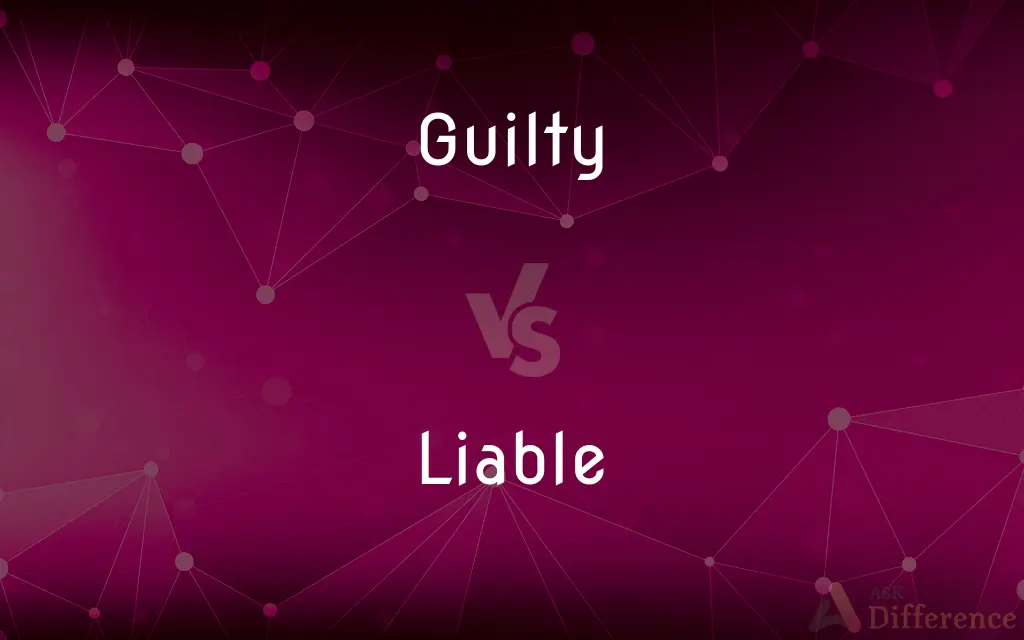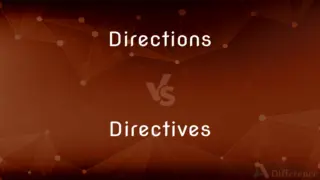Guilty vs. Liable — What's the Difference?
By Tayyaba Rehman — Published on November 9, 2023
"Guilty" means responsible for a wrongdoing, especially in law, while "liable" means legally responsible, often financially, for an act or circumstance.

Difference Between Guilty and Liable
Table of Contents
ADVERTISEMENT
Key Differences
"Guilty" is a term used primarily in the legal system to denote someone who has committed a crime or misdemeanor, directly tying their actions to the wrongdoing. "Liable," however, refers to a person's or entity's legal responsibility for something, especially in civil cases involving reparations or damages.
A guilty verdict in a courtroom is a direct acknowledgment of someone's criminal activity, an admission of their violation of the law. In contrast, being liable doesn't necessarily imply a moral failing or crime but highlights accountability, often in terms of financial or legal obligations.
The concept of guilt extends beyond the legal framework, touching on moral and social aspects of human behavior. Feeling guilty involves a sense of remorse for one's actions. On the other hand, liability is strictly a legal term, denoting the responsibilities one holds in contracts, torts, or legislations.
Being found guilty often leads to penalties such as imprisonment, fines, or other forms of punishment, reflecting society's denouncement of certain behaviors. Liable individuals or companies might not face criminal charges but are often required to compensate for losses, damages, or injuries they caused.
While guilt implies a clear breach of law or ethical conduct, necessitating penance or punishment, liability can arise from the complexities of legal relationships without any intentional wrongdoing, focusing more on restitution than punishment.
ADVERTISEMENT
Comparison Chart
Legal Connotation
Criminal responsibility
Legal responsibility, often financial
Implication
Wrongdoing, violation of law
Accountability, potential for repercussions
Outcome
Punishment, e.g., imprisonment, fines
Compensation, damages payment
Moral Component
Involves moral/ethical breach
Primarily legal, not moral
Application
Criminal law
Civil law, contracts, torts
Compare with Definitions
Guilty
Culpable of a misdeed
She felt guilty for breaking her friend's vase.
Liable
Subject to legal obligation
Businesses are liable for the safety of their customers.
Guilty
Characterized by guilt
His guilty conscience kept him awake at night.
Liable
Susceptible to legal action
Negligent medical practitioners are liable to malpractice lawsuits.
Guilty
Aware of personal wrongdoing
He had a guilty look after lying to his parents.
Liable
At risk of experiencing something undesirable
Without a coat, you're liable to catch a cold.
Guilty
Result of judicial proceeding
After a lengthy trial, she was pronounced guilty.
Liable
Bound by law
Drivers are liable for damages caused in a traffic accident.
Guilty
Responsible for a reprehensible act; culpable.
Liable
Legally obligated or responsible
Liable to pay for damages.
Liable for negligence.
Guilty
(Law) Found to have violated a criminal law by a jury or judge.
Liable
Subject to undergoing or suffering something, especially something unpleasant. Used with to
We did not use glass containers because they are liable to breakage.
Guilty
Deserving blame, as for an error
Guilty of misjudgment.
Liable
Likely. Often used with reference to an unfavorable outcome
People who are sleep deprived are liable to make mistakes.
Guilty
Suffering from or prompted by a sense of guilt
A guilty conscience.
Liable
Bound or obliged in law or equity; responsible; answerable.
The surety is liable for the debt of his principal.
Guilty
Suggesting or entailing guilt
A guilty smirk.
A guilty secret.
Liable
Subject; susceptible.
This crime is liable to imprisonment for life.
A man liable to heart disease.
Guilty
Responsible for a dishonest act.
He was guilty of cheating at cards.
Liable
Exposed to a certain contingency or causality, more or less probable.
Guilty
(legal) Judged to have committed a crime.
The guilty man was led away.
Liable
Likely.
Guilty
Having a sense of guilt.
Do you have a guilty conscience?
Liable
Bound or obliged in law or equity; responsible; answerable; as, the surety is liable for the debt of his principal.
Guilty
Blameworthy.
I have a guilty secret.
Liable
Exposed to a certain contingency or casualty, more or less probable; - with to and an infinitive or noun; as, liable to slip; liable to accident.
Proudly secure, yet liable to fall.
All human things are subject to decay.
Guilty
(legal) A plea by a defendant who does not contest a charge.
Liable
At risk of or subject to experiencing something usually unpleasant;
He is apt to lose
She is liable to forget
Guilty
(legal) A verdict of a judge or jury on a defendant judged to have committed a crime.
Liable
Subject to legal action;
Liable to criminal charges
Guilty
One who is declared guilty of a crime.
Liable
(often followed by `to') likely to be affected with;
Liable to diabetes
Guilty
Having incurred guilt; criminal; morally delinquent; wicked; chargeable with, or responsible for, something censurable; justly exposed to penalty; - used with of, and usually followed by the crime, sometimes by the punishment; as, guilty of murder.
They answered and said, He is guilty of death.
Nor he, nor you, were guilty of the strife.
Liable
Held legally responsible;
Men between the ages of 18 and 35 were liable for military service
Guilty
Evincing or indicating guilt; involving guilt; as, a guilty look; a guilty act; a guilty feeling.
Liable
Legally answerable
The manufacturer is liable for defects in its products.
Guilty
Conscious; cognizant.
Guilty
Condemned to payment.
Guilty
Responsible for or chargeable with a reprehensible act; or marked by guilt;
Guilty of murder
The guilty person
Secret guilty deeds
A guilty conscience
Guilty behavior
Guilty
Showing a sense of guilt;
A guilty look
The hangdog and shamefaced air of the retreating enemy
Guilty
Responsible for a crime
The jury found the defendant guilty of theft.
Common Curiosities
Can companies be liable for personal injuries?
Yes, companies can be liable for injuries stemming from negligence or unsafe conditions.
Does feeling guilty mean you're legally guilty?
No, feeling guilty is a moral or emotional state, not a legal judgment.
Does guilty always involve a crime?
Typically, yes. "Guilty" is primarily used to denote responsibility for a criminal act.
What happens if I'm liable for a contract breach?
You might have to pay damages or face other contractually stipulated consequences.
Can animals be found guilty?
No, guilt is a legal concept applied to humans, not animals.
Does a guilty plea mean you committed the crime?
Legally, yes, though some might plead guilty for reasons like plea deals.
Are you liable for accidents on your property?
Typically, yes. Property owners are often liable for on-site accidents.
Is liability always financial?
Often, but not always. Liability can involve other responsibilities.
Are children ever found guilty?
Yes, but juvenile justice systems handle these cases differently.
Can you be found guilty without evidence?
Legally, no. Guilt must be proven beyond a reasonable doubt in criminal cases.
Does liable mean you're at fault?
Yes, it means you're legally responsible, which can be due to fault, contract, or law.
Can you feel guilty for something you didn't do?
Yes, people can experience feelings of guilt without actual wrongdoing.
Can guilty people be exonerated?
Yes, if new evidence comes to light or if there's a legal error, guilty parties can be exonerated.
If I'm liable, will I go to jail?
Not usually. Liable often involves civil cases, leading to compensations, not imprisonment.
Can I be liable for someone else's actions?
In some cases, yes, like for employees' actions during work.
Share Your Discovery

Previous Comparison
Caoting vs. Coating
Next Comparison
Directions vs. DirectivesAuthor Spotlight
Written by
Tayyaba RehmanTayyaba Rehman is a distinguished writer, currently serving as a primary contributor to askdifference.com. As a researcher in semantics and etymology, Tayyaba's passion for the complexity of languages and their distinctions has found a perfect home on the platform. Tayyaba delves into the intricacies of language, distinguishing between commonly confused words and phrases, thereby providing clarity for readers worldwide.













































